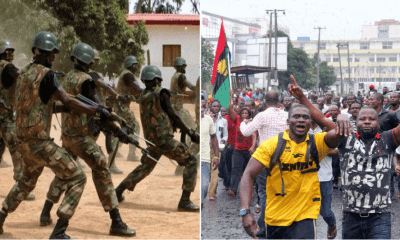Opinion
Tackling Security Challenges in South-East- An Insider’s Account


The current global security environment is increasingly becoming complex and dynamic due to the activities of non-state actors who have become the major source of conflict all over the world. Adding to this is the upsurge in intra-state crisis and conflicts as well as the entanglement between domestic and international threats which have compounded the security challenges.
Africans are containing terror and terrorists, in addition to the rise of repetitive civil conflict in such disparate African countries as Burundi, the Central African Republic, the Democratic Republic of the Congo, South Sudan and Sudan, dangerous depredations of Islamist terror continue to shake lia, Kenya, Cameroon, Chad, Mali, Burkina Faso and Niger.
Nigeria is currently facing multiple security challenges that are spread across the major regions of the country. None of the regions in Nigeria is insulated from one crisis or the other. For instance, there are the lingering challenges of terrorism, cattle rustling, armed banditry, kidnappings, arms and IED proliferation and other sundry crimes such as armed robbery in the North East Region.
There are also the threats of armed robbery, insurgency, ethnoreligious disturbances, cattle rustling, kidnappings and political crisis among other menaces in the North Western part of Nigeria.
Incidences of militancy, arms proliferation, illegal oil bunkering, sea piracy, oil thefts, kidnappings and pipeline vandalisation/ sabotage, armed robbery, cultism and political violence are serious security challenges in the South-South Zone and the Delta Region. So also are the challenges of farmers-herdsmen clashes, cattle rustling, ethnic tension, and the influx of mercenaries and arms flow in Benue, Nasarawa and Taraba States.
Here in the South Eastern Region, we have security threats such as kidnappings, armed robbery, communal crisis, cultism, herdsmen-farmers clashes, the proliferation of arms, political disturbances and the disturbing activities of MOSSOB and the outlawed IPOB groups.
Recently, we are witnesses to the emerging trend of the use of Improvised Explosive Devices (IED) in pursuit of political objectives.
In the midst of these challenges, the Nigerian Army (NA) has a constitutional duty to effectively checkmate these complex national security threats. While in the South East, the NA through the 82 Division, in conjunction with other security agencies have contained these threats to manageable proportion, in the North East and other parts of Nigeria, the NA is fully involved in far more complex security threats such as insurgency, terrorism, cyber threats, militancy, arms and IED proliferation and ethno-religious conflicts.
The relevant security agencies must, therefore, continue to seek new ways and means to consistently mitigate the new challenges and provide an effective deterrence. Consequently, the NA under Lt Gen TY Buratai proactively and consistently appraised the numerous security threats across the nation, initiated and conducted several Field Training Exercises and Operations with the major aim of containing the threats.
These exercises were deliberately initiated and conducted with an overarching aim of checkmating identified security challenges in the regions where they were carried out. In this regard, Exercise SHIRIN HARBI, for example, was originally staged from 17- 19 April 2016 in 3 Division Area of Responsibility to take care of the insurgency, cattle rustling and armed banditry common in parts of the North Eastern Region. In the same vein, Exercise HARBIN KUNAMA was held in 1 Division Area of Responsibility from 9-15 July 2016 to rid the general area of the North West Region of banditry, insurgency, religious insurrection, armed robbery and cattle rustling among other menaces.
Also, Exercise CROCODILE SMILE was conducted originally from 5-10 September 2016 in the Niger Delta Region by a combination of 2 and 82 Divisions with the major aim of reducing incidences of illegal bunkering, piracy, the influx of arms, pipeline vandalization, kidnappings and other criminalities across the entire region.
Similarly, here in the South Eastern Region, Exercise PYTHON DANCE was initially carried out from 27 November – 27 December 2016. The peculiar security challenges in the region such as kidnappings, armed robbery, cultism, farmers-herdsmen clashes, communal conflicts, traffic gridlock particularly at the Asaba-Onitsha Head Bridge and the violent secessionist agitation among others were the targets of the exercise.
On the whole, these exercises were successfully conducted as the objectives of the exercises/operations were greatly achieved. For that reason, all the exercises are now scheduled NA training exercises which are being conducted annually in the various regions of the nation.
We may recall that despite the initial disinformation, agitation and misplaced apprehension about Exercise PYTHON DANCE in 2016 and now Exercise EGWU EKE 11 in 2017, the record of achievements of the exercise are many and are acknowledged by well-meaning Nigerians up to today.
One major achievement is in the area of peace and security. Due to the intensity of patrols, roadblocks, raids and other activities in the Military Line of Operation, miscreants and criminals were denied freedom of action in the entire South Eastern States of Abia, Anambra, Ebonyi, Enugu and Imo. The account of peace, law and order and secure environment in the entire South Eastern Region occasioned by the exercise was widely circulated by the media among others and is being enjoyed up to today.
Therefore, in view of the obvious security threats in the South East such as kidnappings, cultism, armed robbery, communal conflict, farmers-herdsmen clashes, political violence and secessionist agitation as well as the emerging dangerous trend of the use of IED as seen in the recent explosion in Ohanaeze leaders’ compound, a catholic church and a popular yam market, there is the need for members of the public especially the media to be more watchful, so as to sensitize the public on the disturbing trend and the necessity for partnership with the security agencies with the view to collectively and effectively contain these challenges.
Finally, in the midst of all these security threats, it is obvious that the South East Zone is the most peaceful region in Nigeria. Major security challenges that could have dramatically disturb the peace; security and stability of the region have been effectively silenced. Consequently, there is the need for the various tiers of government, security agencies, Civil Society Organizations, media and members of the public to collectively cooperate to improving if not sustaining the current security situation.
Colonel Sagir Musa
Deputy Director Army Public REaltionas
82 Division, Enugu











